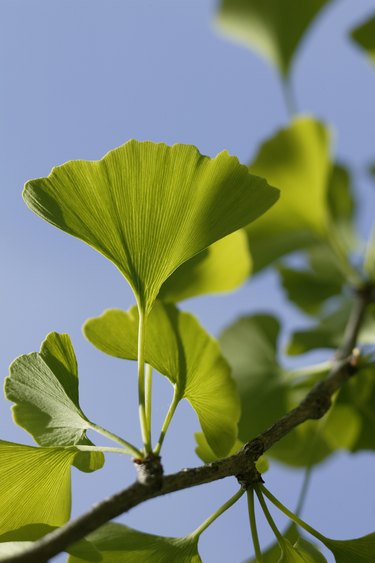
Dizziness -- a feeling that you or your surroundings are spinning -- can be an alarming sensation, but rarely signals a life-threatening condition. Nonetheless, unexplained dizziness calls for a doctor visit. MayoClinic.com advises seeking emergency treatment if dizziness is accompanied by head injury or severe headache, stiff neck, blurred vision, chest pain, high fever, impairment of speech or difficulty walking. Also called vertigo, dizziness can be caused by benign paroxysmal positional vertigo, inner ear inflammations, Meniere's disease, and certain medications. Natural healers often recommend ginkgo biloba to alleviate dizziness. Consult your doctor before taking ginkgo biloba.
Features
Video of the Day
The ginkgo biloba tree -- also called yinhsing and silver apricot -- is virtually a living fossil, with an ancestry tracing back more than 200 million years to the Permian geologic period. Once in danger of extinction, the ginkgo tree survived thanks to cultivation by Buddhist monks. Ginkgoes can grow to 70 feet tall, and feature fan-shaped leaves. The female trees produce a foul-smelling brown fruit; its edible seeds resemble almonds, and are sold as a delicacy in Asia. Ginkgo has been used since the 11th century in Traditional Chinese Medicine to stimulate digestion, treat asthma and alleviate inflamed capillaries resulting from exposure to cold weather, also called chilblains. Present-day herbalists advise ginkgo to boost the immune system and treat cerebral insufficiency, cognitive impairment, vascular disease, schizophrenia, tinnitus and vertigo.
Video of the Day
Constituents and Effects
Ginkgo contains two beneficial groups of constituents: antioxidant flavonoids -- including quercetin, kaempferol and isorhamnetine -- and terpenes, which include ginkgolides and a compound called bilobalide, both unique to ginkgo. Ginkgetin, bilobetin and catechins -- polyphenols also found in green tea -- are present in ginkgo, as are antioxidant plant pigments called proanthocyanins. Drugs.com -- which provides peer-reviewed medical information to consumers -- credits ginkgo biloba with antioxidant and anti-inflammatory properties, as well as effects against arteriosclerosis, asthma, cancer, cerebral insufficiency, Alzheimer's disease and vertigo. Blue Shield Complementary and Alternative Health, BSCAH, reports that the terpenes in ginkgo are associated with increasing circulation to the brain. MayoClinic.com characterizes ginkgo biloba as extremely effective in treating dizziness related to vestibular dysfunction, a balance problem originating in the inner ear.
Research
Ginkgo biloba's abilities to help vertigo are so well documented that researchers use it to test the efficacy of other vertigo treatments. In a double-blind clinical study published in 2005 in "Journal of Alternative and Complementary Medicine," researchers compared the effects of ginkgo biloba with the homeopathic remedy Vertigoheel. Patients taking ginkgo biloba -- as well as Vertigoheel -- experienced reductions in dizziness, as measured by scores on a standard dizziness questionnaire and a line-walking test. Both treatments were found to be equally effective in improving vertigo.
Usage and Considerations
According to BSCAH, the dosage for vertigo used in studies was 120 mg a day of ginkgo biloba extract standardized to 24 percent flavones and 6 percent terpene lactones, taken for three months. Ginkgo may need to be taken for eight to 12 weeks before effects are noticed. Allergic reactions to ginkgo have been reported. Ginkgo should not be used with aspirin or anticoagulants, or by anyone with a vitamin K deficiency. Although ginkgo biloba can be effective in reducing dizziness, it can also cause dizziness as a side effect. Other possible side effects include headache, heart palpitations, gastrointestinal discomfort and skin rash. Consult your doctor before using ginkgo biloba. If you are pregnant or breast feeding, don't take ginkgo biloba.
- Drugs.com: Complete Ginkgo Information
- Blue Shield Complementary and Alternative Medicine: Ginkgo
- "Journal of Alternative and Complementary Medicine"; The Homeopathic Preparation Vertigoheel Versus Ginkgo Biloba in the Treatment of Vertigo in an Elderly Population: a Double-Blind, Randomized, Controlled Trial; W. Issing et al,; February 2005
- MayoClinic.com; Ginkgo (Ginkgo Biloba L.); Natural Standard Patient Monograph; Staff; July 2011
- MayoClinic.com; Dizziness; Mayo Clinic Staff; July 2010